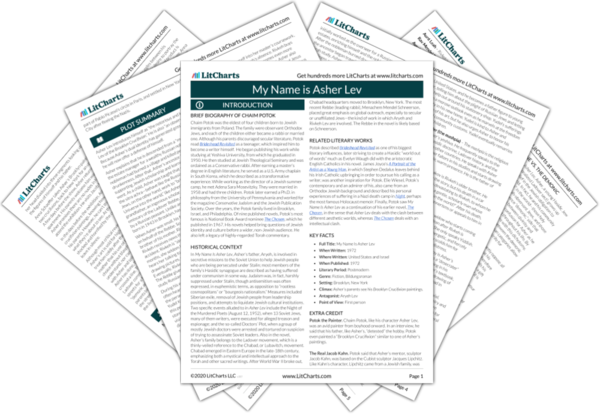Uncle Yaakov Quotes in My Name is Asher Lev
“Asher, are you drawing pretty things? Are you drawing sweet, pretty things?”
I was not drawing pretty things. I was drawing twisted shapes, swirling forms, in blacks and reds and grays. I did not respond.
“Asher, are you drawing birds and flowers and pretty things?”
“I can draw you birds and flowers, Mama.”
“You should draw pretty things, Asher.”
“Shall I draw you a bird, Mama?”
“You should make the world pretty, Asher. Make it sweet and pretty. It’s nice to live in a pretty world.”
Trapped between two realms of meaning, she had straddled both realms, quietly feeding and nourishing them both, and herself as well. I could only dimly perceive such an awesome act of will. But I could begin to feel her torment now as she waited by our living-room window for both her husband and her son. What did she think of as she stood by the window? Of the phone call that had informed my father of her brother’s death? Would she wait now in dread all the rest of her life, now for me, now for my father, now for us both—as she had once waited for me to return from a museum, as she had once waited for my father to return in a snowstorm? And I could understand her torment now; I could see her waiting endlessly with the fear that someone she loved would be brought to her dead. I could feel her anguish.

Uncle Yaakov Quotes in My Name is Asher Lev
“Asher, are you drawing pretty things? Are you drawing sweet, pretty things?”
I was not drawing pretty things. I was drawing twisted shapes, swirling forms, in blacks and reds and grays. I did not respond.
“Asher, are you drawing birds and flowers and pretty things?”
“I can draw you birds and flowers, Mama.”
“You should draw pretty things, Asher.”
“Shall I draw you a bird, Mama?”
“You should make the world pretty, Asher. Make it sweet and pretty. It’s nice to live in a pretty world.”
Trapped between two realms of meaning, she had straddled both realms, quietly feeding and nourishing them both, and herself as well. I could only dimly perceive such an awesome act of will. But I could begin to feel her torment now as she waited by our living-room window for both her husband and her son. What did she think of as she stood by the window? Of the phone call that had informed my father of her brother’s death? Would she wait now in dread all the rest of her life, now for me, now for my father, now for us both—as she had once waited for me to return from a museum, as she had once waited for my father to return in a snowstorm? And I could understand her torment now; I could see her waiting endlessly with the fear that someone she loved would be brought to her dead. I could feel her anguish.











